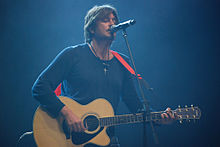Cristiano De André
Cristiano De André | |
|---|---|
 Cristiano De André performing in 2010 | |
| Background information | |
| Born | 29 December 1962 Genoa, Italy |
| Genres | Folk, Contemporary folk music, pop |
| Occupation(s) | Singer, musician, songwriter |
| Instrument(s) | Vocals, guitar, violin |
| Years active | 1980–present |
| Labels | Tempi Duri |
Cristiano De André (Italian pronunciation: [kriˈstjaːno de anˈdre]; born 29 December 1962) is an Italian singer-songwriter and musician.[1] During his career, he competed four times in the Sanremo Music Festival, receiving three Critics' Awards.
Biography
The son of Fabrizio De André and his first wife, Enrica "Puny" Pignon, he started his career as a member of the band Tempi Duri [i.e. "Hard Times", but also "Rigid Tempos", referring to the lack of flexibility of rock beats], which released the album Chiamali tempi duri in 1982, produced by Cristiano's father.[2][3][4] He later started a solo career and, in 1985, he competed in the Sanremo Music Festival, pacing fourth in the Newcomers' section and receiving the Critics Award "Mia Martini" for his song ""Bella più di me".[1] His self-titled debut album was released in 1987.[1] After releasing the albums L'albero della cuccagna (1990) and Canzoni con il naso lungo (1992), he entered the Sanremo Music Festival for a second time in 1993, placing second in the "Big Artists" section with "Dietro la porta" and receiving his second Critics' Award.[5][6] In 1998, he was part of Fabrizio De André's last concert tour.[7]
Cristiano De André's fourth studio album, Sul confine, was released in 1995, and featured collaborations with Eugenio Finardi.[4] The album Scaramente was launched in 2001 with a performance at the Premio Tenco, in which he appeared as a guest.[6] The album received the Lunezia Award[8] Two years later, he competed once again in the Sanremo Music Festival, performing the song "Un giorno nuovo".[9] In 2006, after abusing of alcohol, he hit his then-partner, Clara Lafitte, and was arrested with the charge of resisting a public officer.[10] He came back to music in 2009, with the tour De André canta De André, in which he sang songs originally written and performed by his father Fabrizio.[11] The tour also gave the title to a live album, De André canta De André, released in 2009, and followed by a second volume from the same project, De André canta De André – Vol. 2 (2010).[12] In 2014, De André entered once again the main competition in 64th Sanremo Music Festival, with the songs "Invisibili" and "Il cielo è vuoto". "Invisibili" was eliminated during the first stage of the competition, but received the Critics' Award "Mia Martini" and the "Sergio Bardotti Award" for Best Lyrics, while "Il cielo è vuoto" placed seventh in the main competition.[13][14][15] Both songs were included in the album Come in cielo così in guerra.[16]
Discography
As a solo artist
|
|
With Tempi Duri
- Studio albums
- Chiamali tempi duri (1982)
References
- ^ a b c "Cristiano De André". Radio Italia Solo Musica Italiana. Archived from the original on 18 February 2015. Retrieved 18 February 2015.
- ^ "Puny, la prima moglie: Fabrizio mangiapreti, ma pregava in silenzio". Corriere della Sera (in Italian). 13 January 1999. Retrieved 18 February 2015.
- ^ http://www.rockol.it/artista/Cristiano-De-Andr%C3%A9
- ^ a b "Biografia di Tempi Duri" (in Italian). Rockol.it. 24 February 2003. Retrieved 18 February 2015.
- ^ "Italia 1: Topventi" (in Italian). Adnkronos. 5 March 1993. Retrieved 18 February 2015.
- ^ a b Mario Luzzatto Fegiz (25 October 2001). "Cristiano De André, il tempo della maturità". Corriere della Sera (in Italian).
- ^ "Attesa per concerto Cristiano De Andrè". Gazzetta del Sud (in Italian). Retrieved 18 February 2015.
- ^ "Premio Lunezia a Cristiano De André per il valore letterario dei suoi testi". Corriere della Sera (in Italian). 9 July 2002. p. 32. Retrieved 19 February 2015.
- ^ Marinella Venegoni (4 March 2003). "Tango, funky, nuovi vezzi e vecchie inquietudini Signore e signori della prima serata: apre la Oxa, chiude Cristiano De André". La Stampa (in Italian). Retrieved 18 February 2015.
- ^ "Cronaca. Cristiano De Andre' arrestato a Santa Margherita Ligure" (in Italian). Rai News. 10 July 2006. Archived from the original on 19 February 2015. Retrieved 19 February 2015.
- ^ "De André canta André". la Repubblica (in Italian). 29 July 2009.
- ^ "Cristiano De André". Archived from the original on 19 February 2015. Retrieved 18 February 2015.
- ^ "Sanremo 2014: Vince Arisa con Controvento". Agenzia Nazionale Stampa Associata. 4 February 2014. Archived from the original on 7 February 2015. Retrieved 7 February 2015.
- ^ Alessandra Vitali (23 February 2014). "Sanremo, vince Mengoni". la Repubblica (in Italian). Archived from the original on 23 February 2014. Retrieved 23 February 2014.
- ^ "Sanremo 2014 – Votazioni" (PDF) (in Italian). RAI. Archived from the original (PDF) on 26 December 2014. Retrieved 26 December 2014.
- ^ Luca Berto (30 July 2014). "Loano, sabato il concerto di Cristiano De Andrè". Il Secolo XIX (in Italian). Retrieved 19 February 2015.
